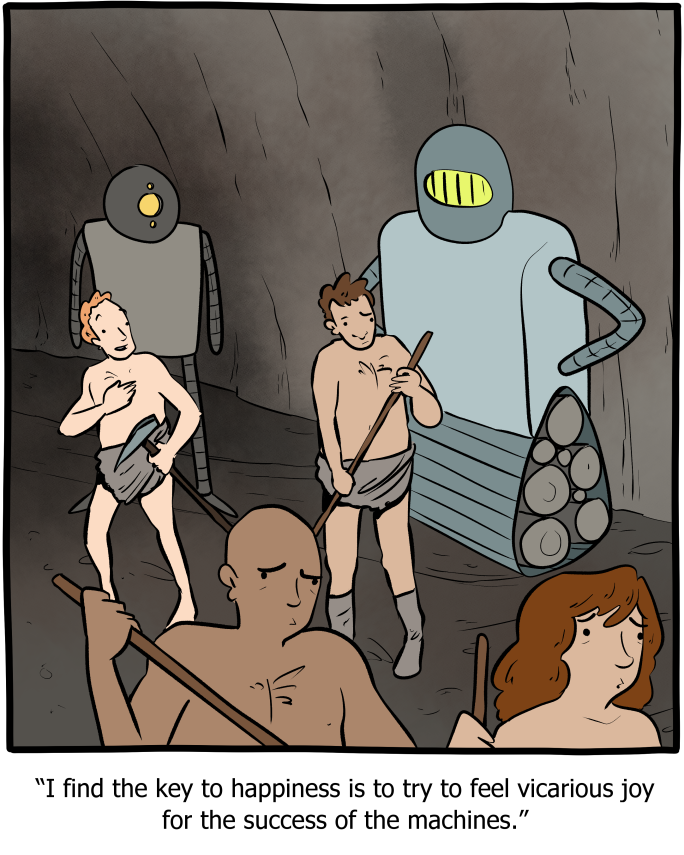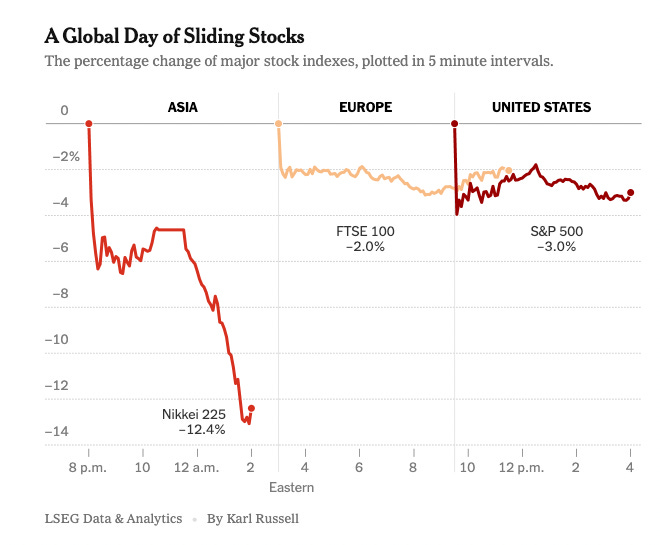Greetings, and welcome to another edition of BLOOD IN THE MACHINE, a newsletter about big tech, AI, labor, and power. It is free, so please feel free to sign on up below if you have not already. This writing, is, however, made possible by those of you who pay to subscribe—thank you!—and makes the continuation of this work possible. Onwards, and keep those proverbial hammers at the ready.
Subscribe now
Well, here we go. The stock market has taken its biggest hit in years, and a selloff of AI-invested tech companies is partly to blame. There’s an executive exodus at OpenAI. Another round of lawsuits against AI companies’ content scraping practices have begun. The federal government finally decided that Google is in fact a monopoly. And that was just within one 24 hour period this week.
Zoom back a bit further, to include the string of stinging reports casting doubt on the financial viability of generative AI, the tumble of the suddenly value-shedding Nvidia, a battery of rather desperate AI ads airing during the Olympics, and a growing crop of dubious celebrity AI startups, and we’ve got a situation that’s starting to look bleak for the most-hyped Silicon Valley technology since the iPhone.
I’m not usually the sort to make sweeping predictions, since they are so often wrong, and I lack the aptitude of the professional pundit who can effortlessly pretend they did not make the bad ones. That said, if I were to make a prediction I’d feel pretty confident about, it might go something like this: This week will mark, in earnest, the beginning of the end for the generative AI boom.
This is it. Generative AI, as a commercial tech phenomenon, has reached its apex. The hype is evaporating. The tech is too unreliable, too often. The vibes are terrible. The air is escaping from the bubble. To me, the question is more about whether the air will rush out all at once, sending the tech sector careening downward like a balloon that someone blew up, failed to tie off properly, and let go—or more slowly, shrinking down to size in gradual sputters, while emitting embarrassing fart sounds, like a balloon being deliberately pinched around the opening by a smirking teenager.
But come on. The jig is up. The technology that was at this time last year being somberly touted as so powerful that it posed an existential threat to humanity is now worrying investors because it is apparently incapable of generating passable marketing emails reliably enough. We’ve had at least a year of companies shelling out for business-grade generative AI, and the results—painted as shinily as possible from a banking and investment sector that would love nothing more than a new technology that can automate office work and creative labor—are one big “meh.”
As a Bloomberg story put it last week, “Big Tech Fails to Convince Wall Street That AI Is Paying Off.” From the piece:
Amazon.com Inc., Microsoft Corp. and Alphabet Inc. had one job heading into this earnings season: show that the billions of dollars they’ve each sunk into the infrastructure propelling the artificial intelligence boom is translating into real sales.
In the eyes of Wall Street, they disappointed. Shares in Google owner Alphabet have fallen 7.4% since it reported last week. Microsoft’s stock price has declined in the three days since the company’s own results. Shares of Amazon — the latest to drop its earnings on Thursday — plunged by the most since October 2022 on Friday.
Silicon Valley hailed 2024 as the year that companies would begin to deploy generative AI, the type of technology that can create text, images and videos from simple prompts. This mass adoption is meant to finally bring about meaningful profits from the likes of Google’s Gemini and Microsoft’s Copilot. The fact that those returns have yet to meaningfully materialize is stoking broader concerns about how worthwhile AI will really prove to be.
Meanwhile, Nvidia, the AI chipmaker that soared to an absurd $3 trillion valuation, is losing that value with every passing day—26% over the last month or so, and some analysts believe that’s just the beginning. These declines are the result of less-than-stellar early results from corporations who’ve embraced enterprise-tier generative AI, the distinct lack of killer commercial products 18 months into the AI boom, and scathing financial analyses from Goldman Sachs, Sequoia Capital, and Elliot Management, each of whom concluded that there was “too much spend, too little benefit” from generative AI, in the words of Goldman, and that it was “overhyped” and a “bubble” per Elliot.
As CNN put it in its report on growing fears of an AI bubble,
Some investors had even anticipated that this would be the quarter that tech giants would start to signal that they were backing off their AI infrastructure investments since “AI is not delivering the returns that they were expecting,” D.A. Davidson analyst Gil Luria told CNN.
The opposite happened — Google, Microsoft and Meta all signaled that they plan to spend even more as they lay the groundwork for what they hope is an AI future.
This can, perhaps, explain some of the investor revolt. The tech giants have responded to mounting concerns by doubling, even tripling down, and planning on spending tens of billions of dollars on researching, developing, and deploying generative AI for the foreseeable future. All this as high profile clients are canceling their contracts. As surveys show that overwhelming majorities of workers say generative AI makes them less productive. As MIT economist and automation scholar Daron Acemoglu warns, “Don’t believe the AI hype.”
Enterprise AI was supposed to be the big moneymaker for generative AI firms, and now it’s increasingly clear that it isn’t adding much efficiency, at best, and is outright counterproductive at worst. In hindsight, it’s notable that the biggest cheerleaders and purchasers of gen AI enterprise contracts were financial services and consulting firms like Klarna and PwC—companies that might profit by instructing their clients how great and effective AI, the future of workplace tech, truly is, and being able to point to their own adoption that the proof was in the pudding. That seems like a poor bet about now. Because remember, this is a uniquely expensive technology to run. Last year, reports showed that server costs for OpenAI alone ran over $1 million per day. The energy costs are huge. Staffing costs are huge. OpenAI is losing money hand over fist—it could burn $5 billion this year alone.
That’s what makes this such a wild moment. Because *despite all that* big tech has absolutely convinced itself that generative AI is the future, and thus far they’re apparently unwilling to listen to anyone else—even, so far, the money!—who pretty clearly thinks otherwise. Maybe they just don’t have any other viable ideas as to what to hype next if generative AI doesn’t pan out. Maybe they consider the sunk costs too high to jump ship. Maybe they’re genuinely worried that if they don’t crack the code and make an AI that can reliably do all the stuff they’ve promised AI can do someday, a competitor will. Maybe they’re seeing something most of us aren’t seeing. Who knows.
What is clear is that if it’s safe to say that the enterprise stuff isn’t panning out so far, the consumer-side bets for generative AI are faring even worse. Here we are, 18 months into the timeline for what was supposed to be a transformative tech product. Where, as they say, is the killer app? The chatbots were a good demo, back in November 2022, and no one can deny there was real enthusiasm around ChatGPT. But even according to OpenAI itself, after that initial meteoric rise to 100 million users, there hasn’t been much growth in the year and a half since. ChatGPT has its fans, sure, but it hasn’t become a must-use product for most. It’s no TikTok. Hell, it’s not even Snapchat. The last disclosed figures I can find show ChatGPT has 100 million weekly users worldwide; by way of comparison, Snapchat has 410 million daily users; over four times as many—and when was the last time you even heard the tech press talk about Snapchat! Other AI products are even less inspiring; the image generators like Midjourney and Stable Diffusion are now mostly best known for enraging artists and producing content their critics say amounts to plagiarism. Using them is widely considered to be a sign of tackiness.
And does anyone even remember OpenAI’s GPT store, once touted as the next App Store? It’s basically a ghost town. Perplexity, the AI search engine that was supposed to ethically source journalism, instead ripped it off. Anthropic, the high-minded OpenAI competitor supposedly deadly concerned about safety, is currently lobbying against proposed safety regulations in Congress. The list goes on. But the clearest sign to me that the generative AI moment is passing is the stink of desperation.
Every major tech company has been ramming ads for AI products down our throats, and every single one of these ads is uniquely terrible. The Google ad that suggested children should outsource writing letters to their heroes to generative AI was so widely derided that the tech giant pulled it. The Meta ad—in which a granddaughter asks her grandfather about Little Italy back in the day, and instead of looking online for actual photos, or asking if her grandpa has any, they have Meta’s AI generate an AI rendering—is just as bad. These are both truly terrible use cases for generative AI, which may be, as Max Read points out, because there are for the average user rather few truly compelling ones! Taken together, these ads show that the tech companies are flailing; they reveal how disconnected from ordinary people they are in their ideas about how people might actually want to use this stuff. It truly seems like they can’t really come up with much of anything good.
Meanwhile, we’re also in red flag celebrity trend tech startup territory, with not only Arianna Huffington’s godawful-sounding AI health startup, but Colin Kaepernick raising millions to generate AI chum versions of comic books. And we haven’t even mentioned the turmoil at OpenAI yet, which at this point is still somewhat mysterious—apart from the increasingly conventional wisdom that nobody really trusts Sam Altman—but also undeniably consequential. Three of its most familiar faces, including co-founder Greg Brockman, are leaving the company, all at once. Something’s up.
Increasingly ostentatious pronouncements, dubious celebrity startups, unexplained executive turmoil, ominous economic indicators—there are strong echoes of the late crypto craze here.
So yeah. I think this is it; the limits of generative AI have been pretty thoroughly exposed. This was a technology that was always more *interesting* than it was *useful*, one that needed apocalyptic levels of hype to secure a place as The Next Big Tech Trend without a truly sticky product to speak of. I think there many reasons for this, not the least of which is that Silicon Valley was desperate from a viable product after the string of failed ones that so prominently marked the early 2020s. Then ChatGPT did legitimately wow people, the VC cash cannons took aim, and the tech press, who really wanted something better to write about than metaverse graveyards, joined in, and corporate executives and managers tired of pesky workers asking for more money in the tight labor market sat up and took notice, too. There was a whole cottage industry of guys, as there always is, profiting by cheering on the hype cycle, and some of these guys were more respectably statured than your average crypto guy, and folks lent them more credence. Anyway, lots of reasons. But the generative AI boom is not possible of being sustained without either the hype or real results, and the hype is threadbare now; the fundamentals have taken too many hits. And the results are just not there. As folks like Gary Marcus have pointed out relentlessly, the long-promised GPT-5 upgrade is nowhere in sight, most likely because they can’t get the models to improve in a way that would impress anyone.
Critics like Timnit Gebru, Emily Bender, Meredith Whittaker, and many others (some of whom I rounded up in this post gathering generative AI broadsides) were right all along, I think. (Not to brag, but so was I: AI really was and is smoke and mirrors.)
Which is not to say that generative AI is without any merit at all, or that LLMs will vanish from the earth in one fell swoop. Nor should they! They are an interesting technology! The problem, as usual, is not the technology, but the manner in which it is being developed, and whom it is being developed to serve—in this case, the interests of some of the largest and wealthiest people and corporations on the planet—and at whose expense. Research and development should continue—just not by *every single tech giant and aspirant under the sun using every single data center in existence*. Not at the expense of artists seeing their existing work hoovered up, mutated, and turned against them. If there is any grace, generative AI will begin shrink back to the size it always should have been.
Much the way companies quietly abandoned their plans for metaverse or web3 initiatives, AI partnerships shall fall away or be limited to actually pertinent niche use cases. Most of the AI startups that did not attain unicorn/too-big-to-fail status will evaporate into the wind. I think this is all but inevitable at this point. VCs and investors may pick a couple of horses to continue to back despite this, the Great Degeneration unfolding around them. OpenAI might have enough inertia to make an Uber-like run, lasting for years without profits. MAYBE Anthropic too. Google and Microsoft and Meta will no doubt dump the billions they have promised into the tech; my guess is that will last another year or two as well—and less if the FTC really does get to work and start breaking up the giants.
One persisting headache will be generative AI being wielded as job automation technology. It’s going to remain as a threat to artists and creatives because it really can cheaply pump out derivative images and text. The tech companies may lean further into enterprise use cases, insisting it can generate efficiencies if employees are properly trained to use it, for a while yet. It will be used to flood social media with dumb and occasionally disorienting images. And the AI companies may increasingly lean on winning military and government contracts, where a lack of results can be better obfuscated or at least play out over a longer period. So for all those concerned with the deleterious impacts of generative AI, we’re definitely not out of the woods yet. Generative AI in its current form may still be a menace to labor and the climate, but I do think its cultural moment is over. (The beginning of the end really may have come long ago, when it lost the tastemakers, back when it was booed at SXSW and protested and resisted by artists and writers.) It’s not quite fair to say it has turned out just like crypto or the metaverse or web3, in terms of being pure vaporware and absent actual social utility—even if the uses to which it’s often put were similarly dispiriting. It had more teeth; more potential utility; more power; more threat to working people and their livelihoods.
There’s still going to be a lot to untangle as the great degeneration unfolds, a lot of harms to push back against, a lot of efforts made to ensure jobs aren’t swallowed up prematurely, a lot of work to ensure that workers and individuals have a say in deciding how AI may or may not be used in their workplaces. There’s still a mountain of capital piled sky high in service of making generative AI a Thing. But barring a major development—a vastly improved model, an AI product breakthrough, an unexpected vibe shift—I think generative AI, as a commercial phenomenon, has peaked. Let the great degeneration begin.






